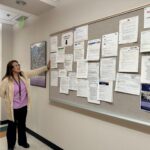As California communities prepare for a possible building boom thanks to voters’ approval of Proposition 1 to fight homelessness, Stockton has already started work on its third mental health-focused housing complex.
Officials in the Central Valley city broke ground earlier this month on Park Center Apartments, a downtown infill development that will provide permanent supportive housing to about 50 San Joaquin County residents with severe mental health disorders who are experiencing homelessness.
The apartments will be the third such complex to be constructed through a partnership between San Joaquin County’s Housing Authority and Behavioral Health Services agencies. In addition to the affordable housing support, the projects also provide on-site case management for its residents and other mental health resources.
“We gather together today amongst dirt, dust and heavy equipment. But I want to remind us that we’re not here simply laying concrete or bricks or mortar,” said San Joaquin County Behavioral Health Services Director Genevieve Valentine during the on-site groundbreaking ceremony April 3. “We’re here to lay a foundation of hope, purpose, compassion and support.”
The new development will take a former vacant office building at the corner of Center and Park streets and transform it into 23 apartments with a manager’s unit. The vacant lot next door was also purchased and will make way for a new adjoining three-story residential complex with 27 apartments and communal and treatment spaces.
HACSJ Executive Director Peter Ragsdale said construction is expected to take about 18 months on the new complex, with hopes for a Christmas 2025 opening. The project marks the third collaboration between the Housing Authority and Behavioral Health in Stockton.
Stockton opens mental health housing complexes
The city’s two existing mental health-focused housing complexes are Crossways Residences, which opened in stages in 2020 and now has 39 apartments, and the newly opened Sonora Square, which debuted late December with 38 apartments.
“There’s a real need in serving our neighbors (who) suffer from mental health challenges,” Ragsdale said. “We’re not going to necessarily solve this issue with affordable housing, but I am certain for the community and folks that will be living here their lives will improve.”
That has certainly been true for residents of other HACSJ projects, including U.S. Army veteran Russell Evans, who attended the groundbreaking. After serving for four years in the Army, including time in Afghanistan, and another two years in the National Guard, the Lodi native became homeless in 2022. He spent about six months living in a Stockton shelter. While there he said he was lucky to be connected with the Housing Authority and officials who told him about Victory Gardens.
Completed in 2022, the complex near San Joaquin General Hospital has 49 units reserved for homeless veterans struggling with mental health, substance abuse and other issues.
Since moving into his apartment, he said he has been able to get his life, and dreams, back on track.
“I’m staying hopeful, my dreams are still alive. And that’s all that matters,” said the 42-year-old. “People need to know that there are these things that can help them. It’s not over if you become homeless, that’s what matters.”

Once open, the new Park Center Apartments will offer similar on-site services as Crossways and Sonora Square. That includes on-site case management, mental health clinicians and links to more mental health support, employment services and other county and health services.
Having services on-site, instead of requiring residents to get transportation to services at other locations, helps them keep appointments and stay on track. San Joaquin County BHS Chief Mental Health Clinician Sasha Jackson said the wrap-around services have made a big difference for residents.
“For the clinical permanent housing, it really helps for individuals to have someone there to help them in the journey with independent living,” Jackson said. “The advantage is that they’ll have their case manager there daily to address issues that they may be experiencing to work with them on their treatment plan. It helps them with the skills and then just to be able to have someone there to talk to them as needed.”
Currently behavioral health staff is on site during business hours. Valentine said they’ve learned from the previous two mental health focused housing projects to try to incorporate more group and treatment space on site. In addition to space for residential mental health services, Park Center will also have a community room and computer room for its residences.
Like with Crossways and Sonora Square, residents of the new complex will need to meet Behavioral Health and Housing Authority requirements. That includes being diagnosed with a “moderate to severe” mental health disorder that impairs function and meeting income eligibility (which for a single person is $20,250 or less annually).
Residents at Sonora Square and Crossways earn well below the annual eligibility requirements at an average of $12,000 and $15,000, respectively.
Prop. 1, other mental health laws being assessed
While no additional Behavioral Health and Housing Authority partnered apartment complexes are currently planned after Park Center is complete, the county has begun its transition to comply with a series of new mental health-focused laws in the state.
That includes the recent passage of Proposition 1, the mental health/homelessness ballot initiative that overhauls how counties can use their behavioral health funding and approves $6.4 billion in bonds for largely institutional housing and treatment facilities. Valley communities are also working to implement CARE Court, a new voluntary pathway through the judicial branch to access mental health services, and the expansion of who qualifies for involuntary conservatorship.
Need in San Joaquin County for mental health services remains acute. The county provides adult services to more than 6,000 residents. Valentine estimates about a third of those cases are managed – which roughly equals about 2,000 individuals who would potentially qualify for mental health-focused housing.
Combined Crossways, Sonora Square and Park Center will provide permanent supportive housing for just under 130 people.
Valentine said San Joaquin County is conducting a needs analysis to see what kind of housing could come out of Prop. 1 and the other new mental-health laws.
“We’re using this next 18 months of transition to really see what is it that we need and where do we need it? Do we need it here in Stockton, or do we need it in south county or north county?” Valentine said. “I think it’s going to be a continuum. So it’s going to be a range of boarding care, enhanced boarding care, permanent supportive care, transitional care. I think it’s really going to be a continuum of housing supportive services.”

Marijke Rowland is the senior health equity reporter for the Central Valley Journalism Collaborative in collaboration with the California Health Care Foundation (CHCF).









